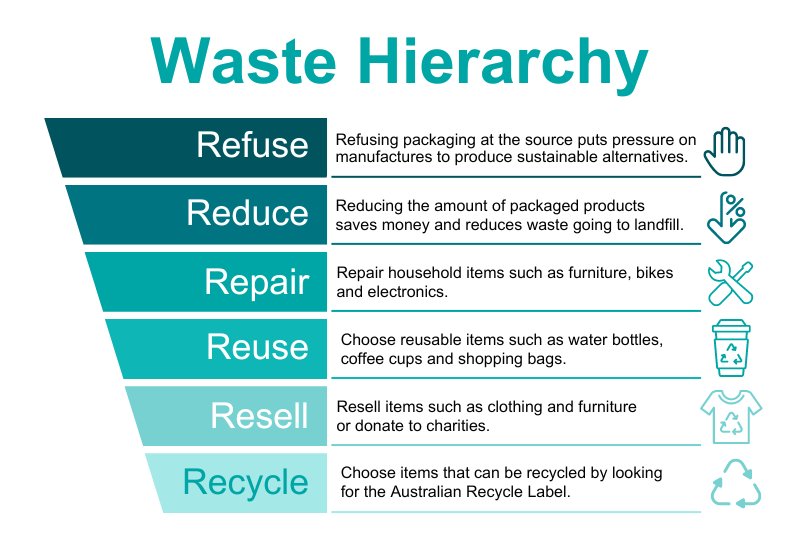Whilst recycling is important, refusing and reducing what we consume is the first step we should take to sustainably manage waste. This reduces the consumption of water, energy, fuel and natural resources needed to make new materials and eventually recycle.
Upcoming Events
Keep up-to-date by visiting our What's On webpage for the upcoming waste and sustainability events and workshops.
Current Awareness Campaign
Georges River Council has joined The Great Unwaste led by the national not-for-profit End Food Waste Australia (EFWA). This nationwide movement rallies all Australians who want to waste less food at home with practical everyday tools, tips and recipes to help save money and environment.
Click the banner below to get started on your Unwaste journey and visit Council's Great Unwaste - YourSay community to ask questions, share your tips, and inspire others.

Council has partnered with Good for the Hood to deliver the @ HOME program for free to residents. These are online webinar series delivered by industry experts on a range of sustainability and waste topics. You can register for live sessions and access past session on the Georges River Council: Good for the Hood page.

More examples of how to use the Waste Hierarchy.
-
Refuse
Refusing products or packaging at the source puts pressure on manufactures to produce more sustainable alternatives.
-
Refuse packaging where possible choosing loose items.
-
Refuse single use produce bags and shopping bags.
-
Refuse over packaged items with multiple layers of packaging.
-
Refuse fast fashion and move towards sustainable fashion.
Try these five simple single-use plastic swaps as a start.
The Plastic Free Foundation provides resources and ideas to help participants refuse and reduce single-use plastic waste every day at home, work, school and in the community.
Refuse items like junk mail by:
-
Reduce
Reducing waste by shopping mindfully saves money and minimises resource use in recycling or disposal into landfill.
Consider:
-
Planning purchases to avoid unnecessary spending. Try a “No Buy Challenge" to commit to avoiding non-essential items for a set-period to build mindful habits.
-
Use a cooling-off period, leave items in your online cart for a day or two before buying to give yourself time to reconsider and avoid impulse purchases.
-
Choose reusable over disposable and opt for quality, sustainable products with a longer life cycle.
-
Choose items with minimal, recyclable or compostable packaging.
-
Plan meals and use a shopping list to prevent food waste. See EPA's Love Food Hate Waste or The Great Unwaste webpages for tips and recipes to reduce food waste.
-
Compost food scraps, reducing the amount of food waste going to landfill.
If you do decide to buy clothing and footwear consider second hand options or purchasing items from brands that support sustainable and ethical practices.
Explore websites such as Ethical Clothing Australia (ECA) and Good on You applications to find local and accredited businesses.
-
Repair
-
Reuse
-
Resell
-
Recycle
If you have exhausted all the above options and have materials to recycle, here are some options are available:
-
The A-Z Recycling and Recycle Mate application provides a comprehensive list of options available to responsibly reuse, recycle or responsibly dispose items.
-
Recycle right using the yellow-lidded recycling bin. Find out the list of accepted items on our Bin Services webpage or watch our short Waste Files - Recycle Right video series for a quick guide.
-
Use the Return and Earn container deposit scheme.
-
E-Waste & Extras Drop-Off are regular council events that offer free recycling of e-waste including televisions, set top boxes, computers and more.
-
Household Chemical CleanOut are Council and EPA NSW events that offer free recycling and safe disposal of chemicals including paints, chemicals, gas bottles and more.
-
Batteries, CDS, DVDS and mobile phones - can be recycled for free at:
-
Georges River Council Civic Centre – Corner of Dora and MacMahon Streets, Hurstville.
-
Clive James Library – Kogarah Town Square, Belgrave Street, Kogarah.
-
Hurstville Library - Corner of Queen and Dora Streets, Hurstville.
Support the Call for Responsible Product Stewardship
Product Stewardship is a policy that holds manufacturers, importers, and retailers responsible for the environmental impacts of their products throughout their lifecycle, including end-of-life disposal and recycling. Georges River Council in association with other local governments in Southern Sydney Regional Organisation of Councils (SSROC) advocates for tougher regulation of materials that cannot be easily repaired, dismantled or recycled.
Consumers can support and drive change by:
-
Asking retailers if they offer recycling or take-back programs.
-
Choosing brands that participate in stewardship schemes.
-
Encouraging businesses to adopt sustainable practices.
Find out more on Produce Stewardship:
Visit Planet Ark to view the latest news on reducing environmental impacts through sustainability and waste minimisation practices.
-
Additional Resources
Find resources such as factsheets and posters on waste reduction topics:
Eco-friendly Celebrations
Thank you for your feedback.